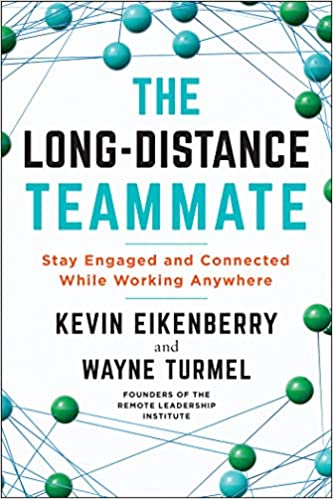I’m delighted to host this guest post from my friends, Kevin Eikenberry and Wayne Turmel as they launch their newest book, The Long Distance Teammate. This topic could not be more timely and it’s addressed skillfully by two experts in the field. Enjoy their post. Consider purchasing their book. Wishing you all the best in the new year and beyond!
Guest Post by Kevin Eikenberry and Wayne Turmel
When we talk to people about being a great remote teammate, the language often revolves around others: offering and accepting feedback from your peers, taking the time to build  relationships and communicate with your teammates, volunteering for new projects and taking part in meetings. It can seem like being a successful member of a team is a selfless act, that it’s all about other people. It is okay to make it about you, as well.
relationships and communicate with your teammates, volunteering for new projects and taking part in meetings. It can seem like being a successful member of a team is a selfless act, that it’s all about other people. It is okay to make it about you, as well.
In The Long-Distance Teammate, Stay Engaged and Connected While Working Anywhere, we remind workers that it’s important to consider others. But in order to be interested, engaged, and motivated, remote workers need to take their own needs into account.
Many people are uncomfortable with that notion. We are conditioned that to be a good worker means “taking one for the team,” to sacrifice our own work and goals to those of the team. Our parents may have told us it’s unseemly to draw attention to ourselves, or that it’s bragging to let people know what your contribution to the team’s work was.
Certainly, selfishness and ego-indulgence can have negative results on a team, but there are some good reasons you should not discount your own needs. In fact, by being clear about what you want and need from your work, you can be an even better teammate while achieving your personal goals.
Here are some of the reasons you need to consider your own needs:
- Constantly sacrificing your needs to those of the team often leads to burnout and disengagement.
- When you don’t consider the long-term impact of your interactions, work becomes transactional and dull. Isolation and depression are frequent side-effects of working (and feeling) alone.
- Without conscious effort, we often blur the lines between work and home and find ourselves losing work-life balance. We work too many hours for too little reward.
- Focusing solely on the work in front of you can lead to frustration and boredom. If there are no challenges, we aren’t having fun, and there are no prospects of things getting better, it can demotivate even the hardest worker.
- By avoiding conversations about what’s going on in the organization, you avoid playing politics but often miss opportunities for advancement and new and interesting work.
- We work harder, smarter, and more productively when we are working towards a goal. Sometimes that goal is work-oriented. Often it is a personal goal. Work is part of your overall life, not the other way around.
- We are more engaged and do better work when we are rewarded for our efforts. Sometimes those are major benefits like a raise, or a promotion. Sometimes it’s the recognition of our peers, or the chance to learn a new skill or try something that stretches our capability.
Certainly, there is a right and wrong way to achieve your goals. In the book, we refer to “ethical visibility,” which is working with your manager and team in a respectful, positive way that also keeps you on their “radar screen” for future opportunities while making your interactions enjoyable and productive.
In order to be a great remote teammate, you must be proactive in building relationships, maintain interest in your work and feel energized by what you do, learn and experience. When it’s all about other people and you fail to receive the rewards of your hard work, it’s hard to stay motivated.
It might seem counter-intuitive, but when you take care of yourself, you feel better, do better work, and are a better teammate to those you interact with.
About the authors
Kevin Eikenberry is a recognized world expert on leadership development and leader of The Kevin Eikenberry Group. He has twice been named by Inc.com as one of the top 100 Leadership/Management Experts in the World. He is the author, co-author or a contributing author to 20 books, including the latest collaboration with Wayne Turmel, The Long-Distance Teammate: Stay Engaged and Connected While Working Anywhere.
Wayne Turmel is the co-founder and Product Line Manager for the Remote Leadership Institute and is the author of several books that demystify communicating through technology. Wayne and Kevin teamed up previously for The Long-Distance Leader: Rules for Remarkable Remote Leadership.

